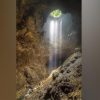Louise Coghill was on the top of the world when its borders started to close.
For four months Coghill, a photographer from the Australian city of Perth, had been hiking the Te Araroa trail: 3,000km down the length of New Zealand, from Cape Reinga in the north to the southernmost point of Bluff.
Coghill had set out in November 2019. By early March she had made it to the Canterbury region of the South Island. The end of her journey was in sight, plus she had picked up a boyfriend, Marco – a Swiss hiker she had met along the way.
But each pocket of network coverage delivered worsening news of a novel coronavirus from overseas. “We would be out of reception from any amount of time from three days, to 10 days – and each time it was getting more intense,” remembers Coghill.
On reaching the Stag Saddle – at 1,925 metres the trail’s highest point, with a panoramic view of Mount Cook – their phones leapt to life for the first time in days: Italy was in lockdown and international travel was rapidly being restricted.
They set out towards Lake Tekapo on the horizon, anxiously discussing their next steps, says Coghill. “Should we fly home before borders shut and airlines close down? It was really nerve wracking. But Marco was like, ‘I’m not going – I came to finish this hike.’”
The decision took them on an unexpected journey: living for nearly four months in a hobbit hole.
Finding a ‘trail angel’
Since Te Araroa was completed in 2011, after a decades-long volunteer campaign led by the writer Geoff Chapple, hundreds of thousands of people walk sections of the trail every year, while the end-to-end route is gaining in popularity.
During the 2018-2019 walking season of October to April 1,100 people walked the full 3,000km – the most ever. An average hiker can complete the route in about five months, traversing wildly different terrain – mountaintops and tiny towns, rivers and volcanoes, beaches, bush, valleys, lakes and plains – over a relatively small distance.
With 90% of the journey off-road, hikers sleep in tents, at government-managed huts, or with good Samaritans based along the route who know to offer a meal or a night’s shelter.
These are known among hikers as “Trail Angels” – and one came to Coghill’s rescue when in mid-March, with just 500km and five weeks’ walking to go, New Zealand announced a national lockdown.
By that time she and Marco were in Canterbury’s Mackenzie Basin, breaking their journey at one of Te Araroa’s hidden gems: a hobbit hole guesthouse.
Coghill had learned about it from other walkers while planning her journey: “It was the one thing that I wanted to do on the trail.” (She has asked that the Guardian be circumspect about its exact location so as to preserve that spirit of discovery.)
Their host Denise had built the tiny cabin on her property as a homage to JRR Tolkien’s cosy creations, which could also double as basic guest accommodation. Though there was no mains electricity, it had battery-operated lights and a fireplace, with a sitting area and a bed nook.
“I actually think hers is way cuter than the one in the movies,” says Coghill. From the outside it appeared as a hillside set with a round front door. “I am small and hobbit-like, so I could stand in it – but Marco is a Gandalf and had to bend to get in.”
Life as a hobbit
The hobbit hole became their home for the full six-week lockdown. Coghill says they tried to show their appreciation by helping out around the house, painting a spare bedroom and sharing kitchen duties. But mostly they lived a quiet life of puzzles, Cluedo and conversations over home-cooked meals. After gruelling months of hiking, along with the anxiety about being far from home in the pandemic, “it was just nice being part of a family”, says Coghill.
When New Zealand’s lockdown lifted in mid-May, Coghill and Marco set out for the final leg of Te Araroa, hiking for another five weeks into winter. By the time they reached Bluff around mid-June, “we were just going through the motions to finish it”, Coghill says. Exhausted, they returned to the hobbit hole, where they spent nearly two more months recuperating before Marco returned to Switzerland – and Coghill to Perth.
Western Australia – like New Zealand, quick to close borders – was relatively untouched by coronavirus, recording only nine deaths all year. For Coghill it has meant an abrupt return to normality after 10 months of living a “quiet, slow, meaningful life” as a hobbit.
“In lockdown everybody was like, ‘guys, we have so much to learn from this experience: we need to slow down, be present’,” she says – but in her experience, people have done the opposite.
Life in Perth seems to be busier than ever, Coghill says, perhaps fuelled by a sense of obligation to make the most of it as the rest of the world adjusts to a devastating new normal.
Even sharing how she spent 2020 has proved difficult: “For some people it’s really nice escapism, and other people are just like, ‘I don’t want to hear about your amazing year.’”
It had a bittersweet ending. Coghill and Marco broke up in December, their long-distance relationship unfeasible over closed borders – but they remain connected by their unique experience of 2020. Coghill is also still in close contact with Denise: “She’s like my second mum now.”
Her plan, when she set out to travel the length of New Zealand, had been to document the kindness of strangers; she could not have imagined the extent to which she would come to rely on it. “New Zealand just doesn’t feel like a real place – it’s too magical. … The community spirit that runs through it is so unique.”
Indeed Coghill’s story is in the spirit of Te Araroa. In 1998, Chapple walked the 1,500km prospective North Island route to demonstrate the project’s viability.
His aim, he wrote on completing it, was “to let the trail speak – to meet the New Zealanders who hunt the bush, who farm, who populate the small towns, and who, as much as ever, but in more dire circumstances now, give this country its character.”
Coghill finished Te Araroa – and with it, 2020 – a different person. “It changed me,” she says. Her chief takeaway was of the importance of kindness and value of generosity, “to give when we can and to share what we have”.
And to cherish the small, quiet moments where we can find them – along with the joy.























































Свежие комментарии